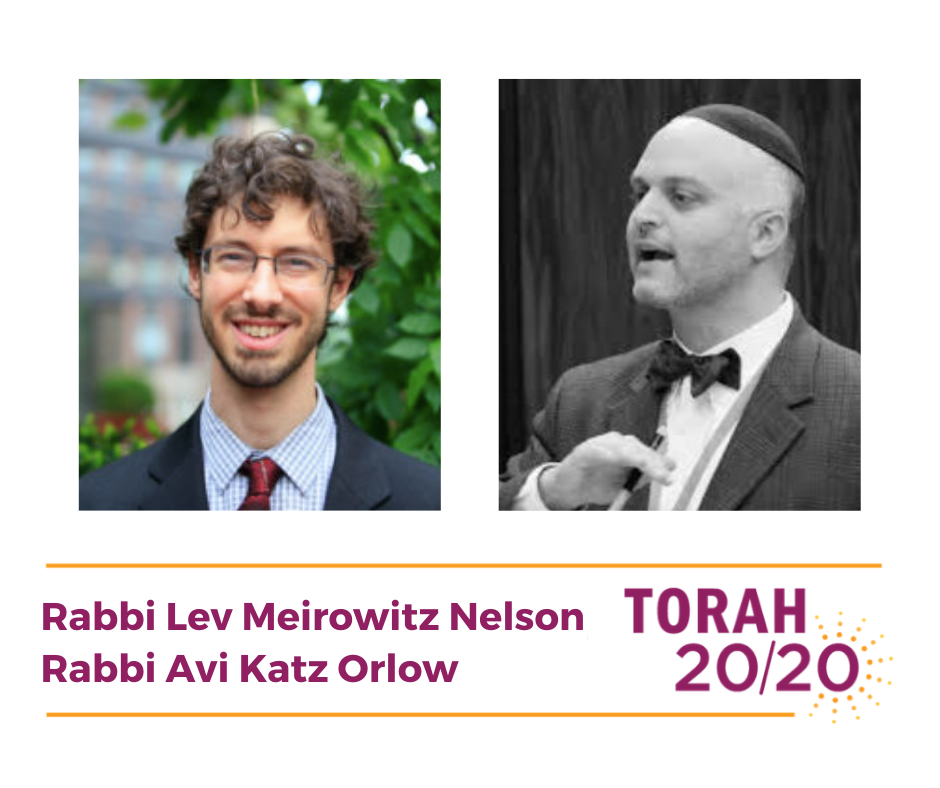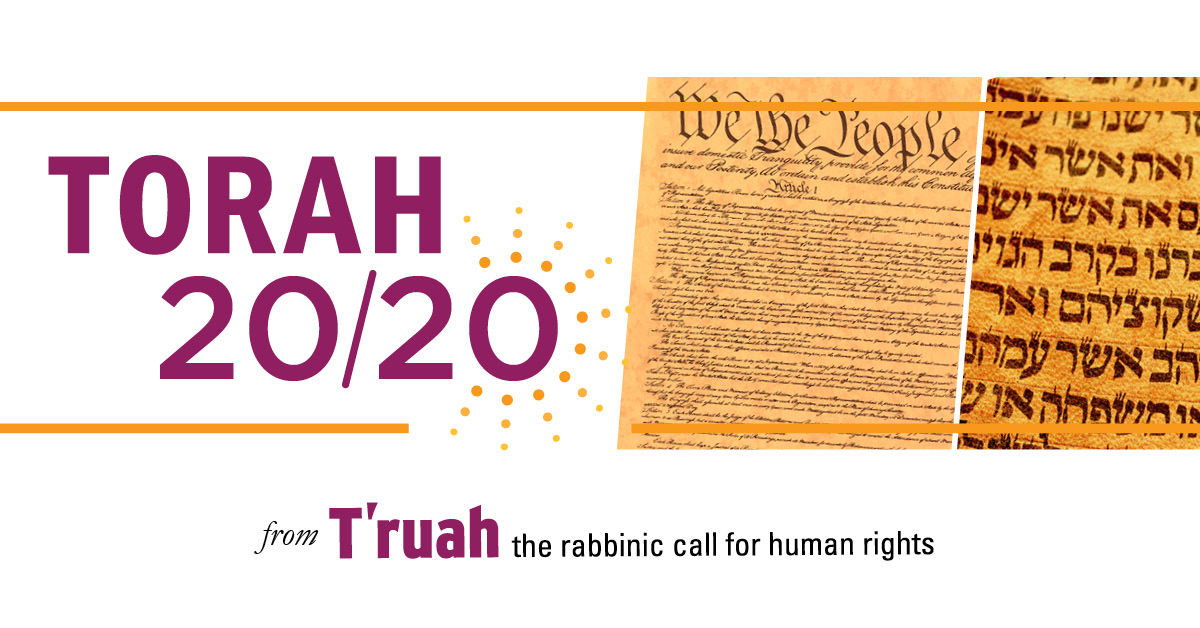A d’var Torah for Simchat Torah.
 Rabbi Avi Katz Orlow is the Vice President at the Foundation for Jewish Camp. He has a deep love of irreverent, relevant, and revealing Torah and blogs religiously at saidtomyself.com. Rabbi Lev Meirowitz Nelson is Director of Rabbinic Training at T’ruah and the editor of Torah 20/20.
Rabbi Avi Katz Orlow is the Vice President at the Foundation for Jewish Camp. He has a deep love of irreverent, relevant, and revealing Torah and blogs religiously at saidtomyself.com. Rabbi Lev Meirowitz Nelson is Director of Rabbinic Training at T’ruah and the editor of Torah 20/20.
Rabbi Lev Meirowitz Nelson: Avi, Torah 20/20 was originally your idea, and you wrote the kickoff edition for Simchat Torah last year. After a full Torah cycle of these divrei Torah, what sticks with you most?
Rabbi Avi Katz Orlow: I’ll never forget Joy Ladin’s d’var Torah about how crucial it is to be able to lose gracefully. As we hear the president say explicitly and repeatedly that he may not accept the election results, the peaceful transition of power feels more and more an essential part of our democracy.
LMN: What was the biggest surprise for you over this project?
AKO: While our study was of the five books of Moses, the issues we have dealt with brought to mind for me the prophets rebuking the people’s disregard for each other. It’s possible we should have focused more on the Haftarot; maybe a worthy project for 5781.
Sign up to receive Torah 20/20 in your inbox each week.
LMN: As you prepare for Simchat Torah this year, what’s on your mind?
AKO: In some ways having an aliyah to the Torah on Simchat Torah reminds me of voting. Every adult member of the community stands up and is counted, putting our values at the center of the lives we lead. Finding my place in the text, I kiss it with my tallit and say the blessing. The act of voting can likewise be seen as an intimate personal expression of blessing a candidate for leadership.
LMN: What are you going to miss most about normal Simchat Torah celebrations this year, given the COVID-19 restrictions?
AKO: I will miss the Kol HaNe’arim aliyah. All the children (under bar/bat mitzvah age) would be called up as a group to the Torah to get a collective aliyah. We adults would have already gotten our chance; now a large, sometimes enormous, tallit would be spread over the heads of the children huddled together as the blessing of the Torah would be pronounced. In this the children are very much reminded that they are being protected as children, but at the same time practicing an activity that will mark their joining the adult community.
So too with voting: We model civic activism to our children. We need to find ways to include those who cannot yet vote in the process so their voices are heard.
In a deeper way Kol HaNe’arim evokes a profound midrash discussing the merit of our receiving the Torah. Just as when you take a loan you need a guarantor, here too in this fantastic narrative God wants to know who will underwrite our commitment to keep the Torah. After God rejects our forefathers and prophets as guarantors, the people say:
‘Our children shall be our guarantors.’ To which God replied: ‘Verily these are good guarantors; for their sake I will give it to you.’ Hence it is written: “Out of the mouth of babes and sucklings have You founded strength (Psalms 8:3). ’Strength’ refers to the Torah, as it says, “The ETERNAL will give strength unto God’s people (Psalms 29:11). (Midrash Rabbah Song of Songs 1:23)
This midrash paints a picture in which, in the deep past, the merit for which we deserved the Torah was dependent on the future: our children. In much the same way, this election in a few weeks is about our children and the world we will bequeath to them. They are depending on us. Will we risk defaulting on our responsibility to give them a better world?
Find more commentaries on Simchat Torah.
LMN: Amen! I’m thinking about how this holiday, and this d’var Torah, are like a siyyum, the ritual celebration when we finish studying a Jewish book. In the siyyum, we say formulaically to the book we have just finished: “We will not forget you and you will not forget us.” I hope we won’t forget the Torah we’ve learned through Torah 20/20, but what does it mean for the Torah of democracy not to forget us?
AKO: Democracy and good Torah learning are all about struggle. Rabbi Hama b. Hanina said it well: “Just as a knife can be sharpened only on the side of another, so a disciple of a sage improves only through their partner” (Talmud Ta’anit 7a). It is in this struggle that we can make a more perfect union.
LMN: I like that, though the image of knives makes me nervous, given the fears about violence after Election Day. I might prefer a slightly less violent metaphor found further down the same page of Talmud: “Rav Naḥman bar Yitzḥak said: Why are Torah matters likened to a tree, as it is stated: “It is a tree of life to them who lay hold upon it” (Proverbs 3:18)? To tell you that just as a small piece of wood can ignite a large piece, so too, minor Torah scholars can sharpen great ones.” This is a big country, but each small one of us can contribute to feeding the fire of democracy so it does not go out.
AKO: Our friends on the West Coast might not appreciate that metaphor right now.
LMN: Fair point. Many of the metaphors for Torah — knives, fire, water — can be dangerous if they get out of control. Which may be true of democracy also: We’re seeing that without close tending, it too can become a dangerous force.
Any final thoughts?
AKO: As we saw in that midrash about guarantors, learning Torah holds real issues between many millennia of generations. The “strength” of the Torah is in its capacity to connect our past and future by being open to the present. For the sake of the children we need to make sure that we guarantee them a brighter future. We need to “turn the hearts of the parents to their children, and the hearts of the children to their parents” (Malachi 3:24), or else our democracy will be destroyed. Just as we have the Torah in the merit of the children, the children will have a state in merit of their elders.

